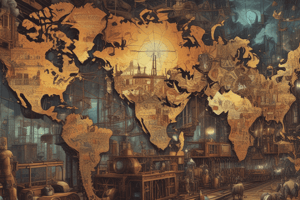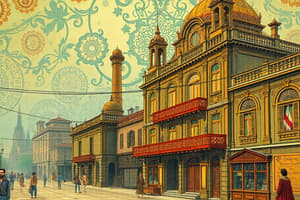Podcast
Questions and Answers
Why did industrialization change the economy of many countries? (Check all that apply)
Why did industrialization change the economy of many countries? (Check all that apply)
- New banking systems financed the growth of business. (correct)
- Governments stopped supporting joint-stock companies.
- Entrepreneurs took on a less dominant role.
- Factories began to employ specialized workers. (correct)
- Individuals began to start more private businesses. (correct)
According to both Emerson and Adam Smith, what guarantees success in a free market system?
According to both Emerson and Adam Smith, what guarantees success in a free market system?
individual freedom
Who owns most farms and factories in a capitalist economy?
Who owns most farms and factories in a capitalist economy?
private individuals
Why did governments authorize the creation of joint-stock companies?
Why did governments authorize the creation of joint-stock companies?
Capitalism is built on the principle of private ownership.
Capitalism is built on the principle of private ownership.
What was one advantage of the division of labor during the growth of industry?
What was one advantage of the division of labor during the growth of industry?
In a capitalist economy, greater competition directly benefits
In a capitalist economy, greater competition directly benefits
Why do governments often regulate business in a capitalist society?
Why do governments often regulate business in a capitalist society?
At the dawn of industrialization, why were entrepreneurs important to changing economies in Europe? (Check all that apply)
At the dawn of industrialization, why were entrepreneurs important to changing economies in Europe? (Check all that apply)
A market that is driven by supply and demand is controlled by
A market that is driven by supply and demand is controlled by
Flashcards are hidden until you start studying
Study Notes
Industrialization and Economic Change
- Industrialization led to a surge in private businesses, enhancing economic opportunities.
- New banking systems emerged to finance and support business growth.
- The role of entrepreneurs shifted, with factories employing specialized workers.
- Governments reduced support for joint-stock companies, altering investment dynamics.
Wealth and Political Economy
- Ralph Waldo Emerson and Adam Smith highlight individual freedom as the key to success in a free market.
- A self-adjusting mechanism of supply and demand governs the political economy without the need for extensive legislation.
- Ensuring equal laws and securing life and property fosters a just society, allowing talent to achieve success.
Ownership in Capitalism
- In a capitalist economy, most farms and factories are owned by private individuals.
- Capitalism revolves around the principle of private ownership as a core tenet.
Division of Labor
- The division of labor during industrial growth allowed workers to specialize, enhancing efficiency in task execution.
Competition and Consumer Benefits
- Increased competition in a capitalist economy benefits consumers by offering more choices and better pricing.
Government Regulation
- Governments often regulate businesses to facilitate the growth and sustainability of larger enterprises within the economy.
Role of Entrepreneurs in Industrialization
- Entrepreneurs played a crucial role in initiating new businesses and improving technology during early industrialization.
- They advocated for reduced government control and invested in the development of novel products and inventions.
Market Dynamics
- Markets driven by supply and demand are fundamentally controlled by the interactions of producers and consumers, balancing needs and resources.
Studying That Suits You
Use AI to generate personalized quizzes and flashcards to suit your learning preferences.



